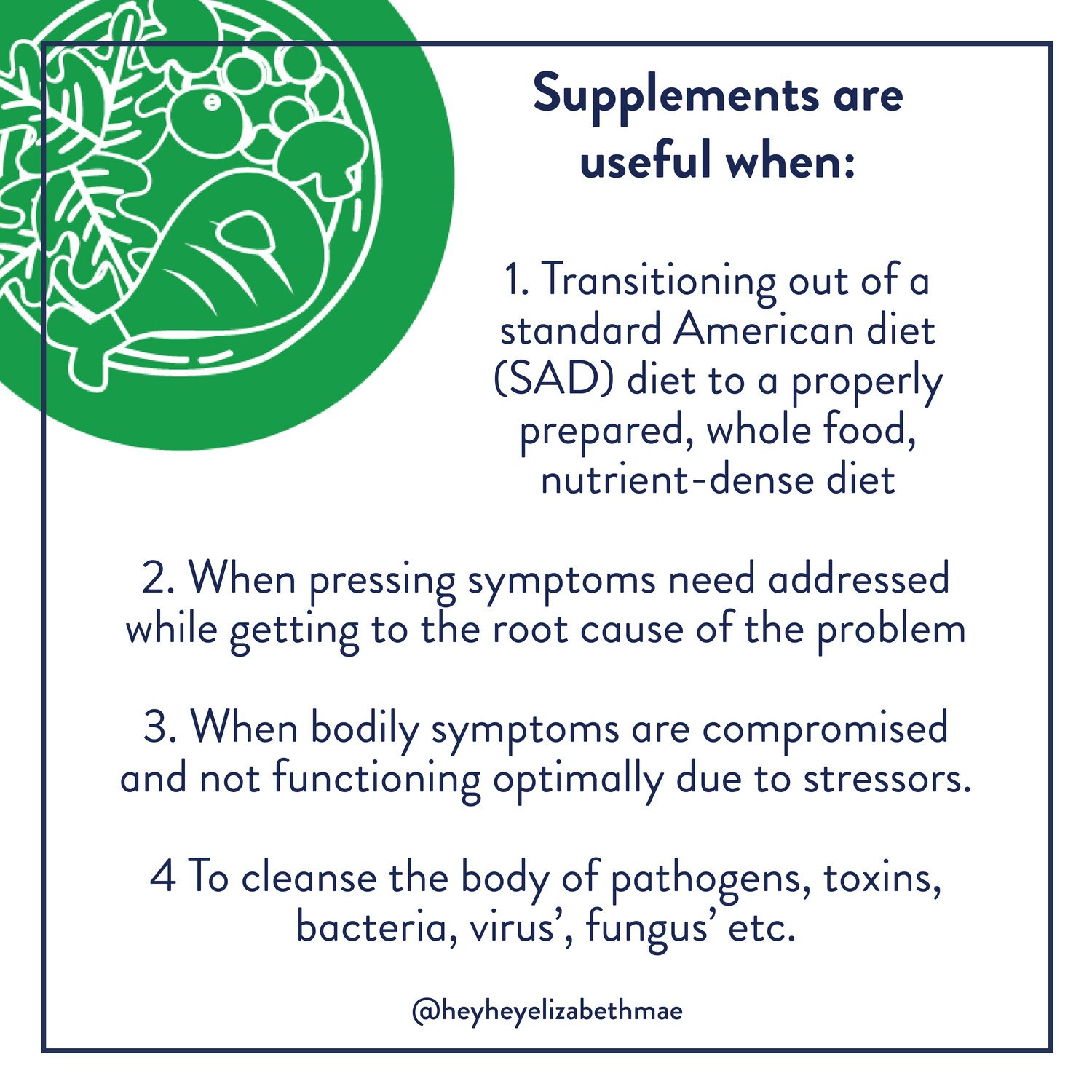Supplement Q & A: What are supplements, how I use them in practice, and what makes a quality product
I have done multiple posts on different supplements that support a range of health concerns such as low stomach acid, a weakened immune system, and gut infection. As with anything that we put into our bodies, it is important to know what it is and what it will do for us-- supplements included. And Oh, how easy it’s been in my own journey to be on a zillion supplements after recommendations from several different practitioners and well - once I learned how to look at each person as a whole body, with purposeful supplements for a season - everything changed - including my client’s progress!
Below are some commonly asked questions about supplements and how and why I use them in my practice.
What are supplements?
A dietary supplement is a product containing vitamins, minerals, herbs, amino acids, and/or enzymes that are used to supplement the diet. Supplements can be in the form of pills, capsules, powders, extracts, or liquids. Ingredients for supplements can be extracted from whole food sources or made from synthetic materials. Supplements bridge the gap, bringing in components we can’t or don’t get from our food at high enough rates.
Why do we supplement?
Supplements are a great addition to a healing protocol, especially when we need to bring in the big guns to get things done. Supplements provide a concentrated dose of nutrients that we can’t necessarily obtain from food, or we can but we’d be eating massive amounts of food to reach those therapeutic levels. When there are gaps in the diet or when bodily systems are not functioning optimally, supplements can come in temporarily to address pressing symptoms and support the body while it heals. They can also be brought in to work at cleansing the body of pathogens, the body’s own waste, toxins and more!
What makes a quality supplement?
Quality is key with supplements. Just as I’ve talked about with food sourcing, we want to look for similar things in a supplement. If a supplement is an animal product such as collagen or beef liver, we want it to be produced from a grass-fed animal. If a supplement is an omega-3 supplement, we want it to be produced from a wild-caught, small bodied fish. If an additional ingredient is a type of oil, we want it to be an MCT oil, not an inflammatory oil like safflower. Any plant-based or herbal supplement is best organic because then we know that it has not been treated chemically.
The FDA regulates supplements under different regulations than food and drugs. Under the Dietary Supplement Health and Education Act (DSHEA) of 1994 it states that manufacturers of dietary supplements and ingredients are prohibited from marketing products that are misbranded. Supplement brands are responsible for testing the safety and labeling of their products before selling to ensure they meet the requirements of the DSHEA and FDA regulations.
Quality supplement brands will perform extensive testing on their supplement ingredients, sustainably source their materials, establish expiration dates for their formulas, and perform third party testing for completed products. Be wary of purchasing products from websites like Amazon because they may be fraudulent. I advise working with a practitioner who can recommend and supply the highest quality supplements.
Why are supplements temporary?
For the most part, they absolutely should be temporary!
Supplements are useful when:
Transitioning out of a SAD (standard American diet) diet to a properly prepared, whole food, nutrient-dense diet
When pressing symptoms need addressed while getting to the root cause of the problem
When bodily symptoms are compromised and not functioning optimally due to stressors.
To cleanse the body of pathogens, toxins, bacteria, virus’, fungus’ etc.
The end goal with any protocol should be to heal the body so that it can perform all vital functions without any supplemental support. Ideally, we obtain all of our vitamins, minerals, herbs, amino acids, and enzymes from the food we eat. We remove stressors on the body (i.e. food sensitivities, lifestyle factors, poor dietary choices, gut infection) to allow it to heal. We eventually clear the body of symptoms, so that it can perform at its highest level.
We use supplements to “supplement” the diet and the body as it heals.
Why do we have to supplement if we eat well?
Good question, sister! A note on our food system and why supplementing may be necessary: modern farming practices and conventional agriculture emphasizes yield over nutrients. This has led to factory farming and monocropping in order for farmers to make a profit on their crops and animals. This system has severely degraded the soil over the last century. Degraded soil contains significantly less nutrients than ever before. A lack of nutrients in the soil means our food contains less nutrients, and therefore we consume less nutrients. The health of our soil matters! See my post for a list of local farmers to support.
What supplements are needed should be determined on an individual basis and with the help of a practitioner.



